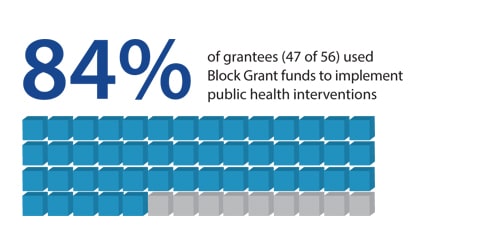Key points
- In October 2017, the first data collection was conducted using the PHHS Block Grant Measurement Framework.
- Data were collected on the measures using a web-based questionnaire given to Block Grant coordinators.
- Data collection covered the performance period of July 1, 2016–June 30, 2017.
- The questionnaire response rate was 93% (n=57/61).

Key Findings
Overall, findings show that the PHHS Block Grant helped state, tribal, local, and territorial agencies by:
- Supporting vital public health activities in grantees' jurisdictions.
- Improving their ability to collect essential data.
- Improving operations, programs, and services.
- addressing emerging needs.
- Implementing evidence-based interventions.
Data impact
Information Systems Capacity Improved
PHHS Block Grant supports public health agencies in improving capacity to collect or enhance data. The data collected by public health information systems are essential. Data are used for identifying, prioritizing, and effectively addressing public health problems. These systems provide timely, actionable data for decision-making.

Quality Improved
The PHHS Block Grant supports improvements in the quality of public health agency operations, programs, and services. More than two-thirds of grantees used PHHS Block Grant funds to improve efficiency and effectiveness. Quality improvement contributes to recipients' ongoing efforts toward measurable improvements in services or processes that improve communities' health.

Emerging Public Health Needs Addressed
The PHHS Block Grant supports public health agency efforts to address emerging public health needs unique to their jurisdiction. More than two-thirds of grantees used PHHS Block Grant funds to improve efficiency and effectiveness within their agencies. Protecting and improving public health often requires the flexibility to tackle public health problems as they emerge. Issues including opioid/prescription drug abuse and other challenges are addressed in states, tribes, and territories through the Block Grant.

Evidence-Based Public Health Practiced
The PHHS Block Grant is used to implement public health interventions1 that work. The majority of grantees used grant funds to implement public health interventions that were evidence-based and maximized outcomes. Most of the interventions that were new or innovative were assessed to see how well they work.
568 of 628 interventions (90%) reported were evidence-based. 3 of 4 grantees collected data on almost 3 out of 4 interventions that were not evidence based to see if they worked, thereby generating practice-based evidence.

- Preventive Health and Health Services Block Grant Evaluation Report: 2017 Framework Measures Assessment—Key Findings
- 1. Public health interventions are defined as any type of planned activity such as program, service or policy. It is designed to prevent disease or injury or promote health.
